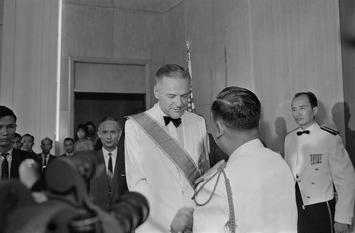
Henry Cabot Lodge Jr. is one of those people—like, say, McGeorge Bundy, W. Averell Harriman, or Allen Dulles—who has largely faded from public consciousness. People may still recognize such names, but they’re rarely aware of what these people did, save perhaps for some older boomers with personal memories. If you’re not one of those, you should pick up The Last Brahmin, Texas A&M history professor Luke Nichter’s recent biography of Lodge’s life and career. The book not only re-illuminates the Republican senator’s life but also provides an implicit commentary on modern American politics.
As the title implies, Lodge was a Boston Brahmin, scion of a leading family of the city’s high WASP (White Anglo-Saxon Protestant) upper class. His family had a history of public service extending back generations, including five U.S. senators. Mentored by his grandfather, Senator Henry Cabot Lodge Sr., Lodge was elected to the House of Representatives after gaining valuable media experience as a newspaper reporter. He then ran for Senate as a liberal Republican in 1936, defeating the infamous crooked Irish politician James Michael Curley. In the prewar years, Lodge was not a strict isolationist but was skeptical of overseas interventions and believed that the U.S. needed to maintain peace through military strength.
During World War II, Lodge, who had long served in the U.S. Army Reserve, resigned his Senate seat to join the military full-time. He served as a close assistant to multiple generals and was highly valued for his fluency in French and German. After the war, he was reelected to the Senate, and his foreign policy began to reflect a more internationalist outlook. Worried that isolationism would destroy the Republican Party, he led the Draft Eisenhower movement and more than any other person was responsible for Eisenhower’s nomination over the isolationist Senator Robert Taft.
His efforts on Eisenhower’s behalf came at the cost of attention to his own reelection bid, however, and he lost his seat to John F. Kennedy. It was the beginning of the end of his political career. He went on to serve as UN ambassador under Eisenhower, and he was Richard Nixon’s running mate in a losing 1960 presidential race. Under Presidents Kennedy and Johnson, Lodge was ambassador to South Vietnam as the Vietnam War escalated, before easing into semi-retirement as U.S. envoy to the Vatican under Presidents Nixon and Ford.
Lodge stands today as an exemplar of a lost set of values in America. Born to a privileged family, he considered it his natural duty and right to serve his country. His upper-class origins gave him confidence in his capabilities and decision-making. But he also placed country above party or personal advantage. It’s unthinkable today that a politician would resign a Senate seat to fight in a war. It’s rare for a person of privileged background to serve in the military at all, unless he’s burnishing his résumé for future political ambitions.
Lodge in essence torpedoed his political career in order to save the Republican Party by drafting Eisenhower. His integrity and loyalty were such that presidents of both parties called on him to serve. He once said, “Service in any situation—foreign or domestic—which acutely involves American security must always be considered from a totally unpartisan viewpoint, without regard to party politics, important though party politics are.” When Kennedy appointed him ambassador to South Vietnam, he told the president, “I want you to know that if it will serve the United States, I am expendable. Just don’t do it for unimportant reasons.” The Kennedys took him up on that offer, blaming him for the coup against South Vietnamese president Ngo Dinh Diem. Nichter unearthed tapes showing that Lodge was operating under Kennedy’s instructions, but he declined to defend himself.
Read the rest of this piece at City Journal.
Aaron M. Renn is an opinion-leading urban analyst, consultant, speaker and writer on a mission to help America’s cities and people thrive and find real success in the 21st century. He focuses on urban, economic development and infrastructure policy in the greater American Midwest. He also regularly contributes to and is cited by national and global media outlets, and his work has appeared in many publications, including the The Guardian, The New York Times and The Washington Post.
Photo credit: Manhhai via Flickr under CC 2.0 License.












